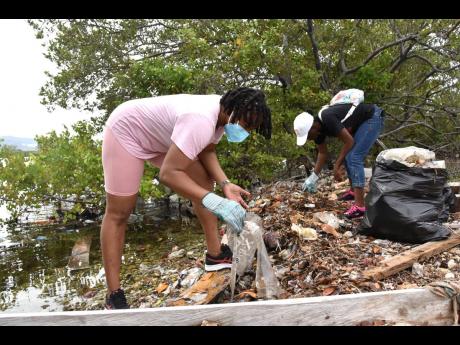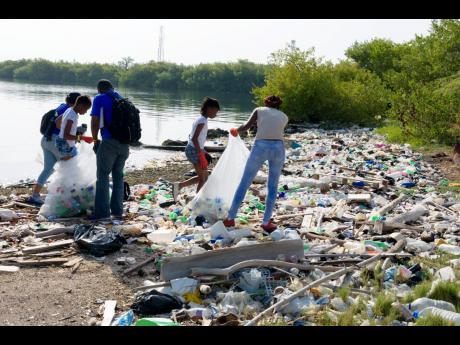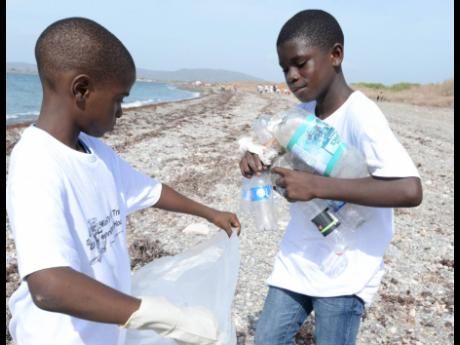Holes in plastic ban
Investigation uncovers breaches and spotlights possible loopholes in the law
Nearly three and a half years after the Government moved to ban certain categories of single-use plastic bags and drinking straws, some of the prohibited items are still widely available in commercial districts across the island with stakeholders...
Nearly three and a half years after the Government moved to ban certain categories of single-use plastic bags and drinking straws, some of the prohibited items are still widely available in commercial districts across the island with stakeholders noting that some legislative loopholes are being exploited.
The phased ban on the manufacturing, importation, distribution and use of the products began on January 1, 2019 amid concerns over the environmental impact of plastics, which littered gullies, streets, the coastline and other areas and the long period it takes the material to degrade.
Jamaica, it was then estimated, had one of the highest per capita usage of plastic bags in the world with the average person using 500 per year.
And while the ban has been having an impact in reducing usage, Dr Theresa Rodriguez Moodie, CEO of the Jamaica Environment Trust (JET), believes some commercial interests are finding creative ways around it.
“I think the ban has worked to some degree. We have seen a reduction in plastic bags generally; however, we are still seeing different sizes of bags being used. It has not eliminated plastic bags entirely. This may very well be caused by a loophole in the law, as the ban is very specific in terms of size and thickness. What we have seen is that people have just moved to a different size plastic bag,” she told The Sunday Gleaner.
The JET boss noted that the use of plastic bags, commonly referred to as ‘scandals’, seems to be more prevalent in rural parishes and is urging lawmakers to go back to the drawing board and close gaps in the legislation.
The ban is governed under the Natural Resources Conservation Authority (Plastic Packaging Materials) Prohibition Order, which carries fines of up to $50,000, and the Trade (Plastic Packaging Materials Prohibition) Order, which has a maximum fine of $2 million. Both orders carry a term of imprisonment of up to two years.
Rodriguez Moodie believes environmental monitoring and enforcement has always been a challenge in Jamaica.
“If the fines were stronger, you’d probably see more compliance,” she said of the plastic ban orders.
Up to last Friday, 42 charges were before the parish courts for breaches of the Natural Resources Conservation Authority (Plastic Packaging Materials) Prohibition Order. According to the National Environment and Planning Agency (NEPA), those “breaches involved persons or entities using and/or distributing single-use plastic bags that are 610mm x 610mm and 1.2mils in thickness and/or drinking straws, made wholly or in part of polyethylene or polypropylene manufactured for single use”.
No arrests were made in relation to the breaches.
Jamaica Manufacturers’ and Exporters’ Association (JMEA) President John Mahfood said he was unaware of whether any entity in his umbrella group was flouting the orders.
“That has not really been brought to my attention so I can’t comment on that. Chances are those are imported, if it’s happening, and I don’t think it is extensive,” said the JMEA boss, who believes the ban has been “very effective”.
As the Government moved to also ban Styrofoam in 2020, Rodriguez Moodie said she noticed another shift in practice that was also potentially harmful to the environment.
“We have banned one type of plastic for a harder type of plastic. That’s what JET observed in the most recent clean-up this year,” she said, as several food outlets are now serving meals in hard plastic containers.
However, the JET CEO said the ban has had a significant impact on the use of plastic straws.
“You hardly see those any more. You see paper straws now,” she said.
Plastic bottle problem
Rodriquez Moodie also highlighted that plastic bottles, which are not included in the ban, remain a major problem.
“The only way we are going to have a reduction in plastic is to go to the source – the generation of the plastic. It’s convenient and cheaper to transport, but it is a major problem; not just in Jamaica but worldwide,” she said.
“I think it is slightly better off, but there is much more work that is needed to see real improvements. This extends to not only the use of plastic products, but practices around disposal. That’s one of our biggest issues – our poor solid waste management and practices,” she said.
According to the JET boss, education campaigns and other systems have not worked in eliminating the deleterious environmental impact of plastic bottles. She suggested a ban on plastic bottles is perhaps the only way to deal with the problem.
“I don’t see any other way,” said the JET CEO.
“The real problem is plastic bottles,” environmentalist Peter Espuet agreed last week. “If you look in any garbage skip, what are you seeing? Plastic bottles. That’s the next problem to be solved.”
While noting that there had indeed been a reduction in the use of single-use plastics since the ban, he called for a ramping up of efforts around the deposit refund schemes for plastic bottles.
“Although I still observe people with plastic bags on the road, about 80 per cent is still a pass for compliance of the people,” he said, giving the current ban a passing grade. “However, I would give a ‘D’ for enforcement; never heard of people being arrested for scandal bags or Styrofoam.”
NEPA, the state’s environmental watchdog, told The Sunday Gleaner: “In general, the implementation of the ban has been wholly successful if one uses the scarcity of the items in the market, the cessation of in-country production of the banned products, the marked change in consumers’ behaviour and attitude and the adoption and use of reusable bags and the positive compliance of trade, industry and businesses.”
However, it accepted that aspects of the current policy position, including the approach to enforcement, were in need of amendments.
“Generally, the ban is being complied with, especially by businesses that operate in the formal sector. More work is required in the market districts,” it further stated.
The agency said that it has conducted 32 compliance and enforcement initiatives since January 2019 and that the use and distribution of single-use plastic bags was flagged as the most frequent breach.
The agency’s own advertised hotline to give the public more information on the ban is also out of service, The Sunday Gleaner found. Ollyvia Anderson, public education and corporate communication manager at NEPA, said the agency would have to look into the matter.
Gillian Guthrie, chief technical director in the policy, planning and evaluation division of the Ministry of Economic Growth and Job Creation, told The Sunday Gleaner that changes are coming to the legislation governing the ban. However, those changes may not go as far as local environmentalists would like to see.
“It is indeed true that a large portion of plastic waste generated in the country is plastic bottles. I don’t know if we can ban plastic bottles … . We just need to be innovative in terms of the plastic waste we collect. We have to make it economically viable,” she said.
Guthrie accepted that the enforcement needs improvement, but called on Jamaicans to play their part.
“It (the ban) has had a material impact, but it is not as successful as we would want,” she said.
“We would not have enough officers to police every Jamaican. Some of it has to be personal responsibility. But we need to beef up enforcement, we have recognised that. We have to continue to roll out a comprehensive public education campaign. We will be targeting town centres across the country in this financial year,” said Guthrie, adding that a previous campaign was derailed by the pandemic.
The ban on straws attached to juice boxes and pouches, which was to take effect in January 2021, was delayed until September 2021 as a result of supply chain disruptions spawned by the COVID-19 pandemic.
“It is now law,” Guthrie said. “If you go to the supermarket, you shouldn’t see any of those straws attached to drink boxes.” Guthrie said.
Efforts to get a comment from the Jamaica Customs Agency on monitoring and compliance on the import side of the policy were unsuccessful.
PLASTIC BAN FACTS
PLASTIC BAN LAWS
• In 2018, the Government of Jamaica announced a policy to implement a ban on the manufacturing, importation, distribution and use of certain single-use plastic (scandal) bags, plastic drinking straws and expanded polystyrene foam products, in three phases, starting January 1, 2019.
• Two Orders were prepared and gazetted on December 24, 2018. They are: The Natural Resources Conservation Authority (Plastic Packaging Materials Prohibition) Order, 2018 and The Trade (Plastic Packaging Materials Prohibition) Order, 2018.
• The ban was the Government’s answer to the detrimental impact of plastic pollution on the environment, especially marine life.
• Under the guidance of the Ministry of Economic Growth and Job Creation, several public sector departments and agencies are charged with implementation and enforcement of the ban; namely: National Environment and Planning Agency (NEPA); Jamaica Customs Agency; National Solid Waste Management Authority (NSWMA); National Compliance Regulatory Authority (NCRA); and the Bureau of Standards.
• Breaches of the plastic ban attract a maximum fine of $50,000 for individuals and a maximum fine of $2 million for businesses, or a term of one-year imprisonment at hard labour.
IMPACT OF PLASTIC POLLUTION ON THE ENVIRONMENT
• Each year, more than eight million tons of plastic end up in the oceans globally, adversely impacting ecosystems, biodiversity and human health.
• In Jamaica, of the 800,000 tons of residential waste generated annually, 15 per cent is estimated to be plastics. While three-quarters of this is disposed of at legal disposal sites, the remainder often ends up in drains, rivers, gullies, beaches and, ultimately, the ocean.
• Styrofoam and plastics take an inordinately long period to biodegrade, and both materials comprise approximately 50 per cent of the non-biodegradable waste generated locally.
• Plastic pollution results in flooding, especially after heavy rainfall, which contributes to severe flooding and ultimately cause tremendous damage to life and property; damage to coastal and marine ecosystems; and is creating an unhealthy environment for local populations.
• Small Island Developing States (SIDS) such as Jamaica are vulnerable to global environmental challenges, including climate change and marine litter.
• Plastic pollution is one of the biggest threats to the fragile ecosystems of island states.
• Sea mammals such as whales and turtles as well as sea birds and other sea life ingest plastics, leading to fatalities. Microplastics are often discovered in fish which is in turn consumed by humans.



